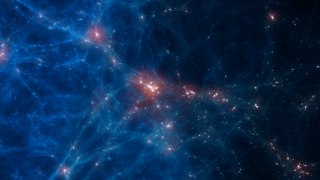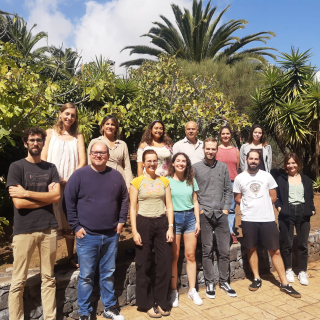Bibcode
Mostoghiu, R.; Di Cintio, A.; Knebe, Alexander; Libeskind, Noam I.; Minchev, Ivan; Brook, C.
Referencia bibliográfica
Monthly Notices of the Royal Astronomical Society, Volume 480, Issue 4, p.4455-4467
Fecha de publicación:
11
2018
Número de citas
12
Número de citas referidas
11
Descripción
HST/ACS observations along the major axis of M33 show that the mean age
of its stars decreases with increasing distance from the galaxy centre.
Such a behaviour is consistent with an inside-out growth of the disc.
However, in the outermost observed field, at r ≃ 11.6 kpc, a
reversal of this gradient is detected, with old stars found in high
percentages beyond this radius. In this work, we investigate the origin
of such a reversal in stellar age gradient, by using a simulated M33
analogue from the Constrained Local UniversE Simulations (CLUES). The
simulated M33 is similar to the observed one in terms of mass, rotation
velocity, surface brightness, and, similar to what has been reported in
observations, shows a stellar age turnaround at large radii. We
demonstrate that this reversal is mostly a result of stellar accretion
from old satellite galaxies and, to a lesser extent, of stellar
migration of in-situ stars. The old accreted stars, with formation times
tf < 4 Gyrs, are kinematically hot and can be
differentiated from the in-situ stars by their high velocity dispersion
and the fact that they do not have rotationally supported orbits. In the
future, obtaining kinematic information of the stars in the outskirt of
M33 will help to verify this scenario.
Proyectos relacionados

Astrofísica Numérica: Formación y Evolución de Galaxias
Entre las cuestiones fundamentales en Astronomía y Astrofísica están la formación y evolución de galaxias. Las escalas de tiempo y tamaño son tan astronómicas que su observación en galaxias individuales es imposible. Solo con el uso de simulaciones numéricas es posible entender la formación de estructuras cósmicas dentro del actual marco
Claudio
Dalla Vecchia

Huellas de la Formación de las Galaxias: Poblaciones estelares, Dinámica y Morfología
Bienvenida a la página web del g rupo de investigación Traces of Galaxy Formation. Somos un grupo de investigación amplio, diverso y muy activo cuyo objetivo principal es entender la formación de galaxias en el Universo de una manera lo más completa posible. Con el estudio detellado de las poblaciones estelares como bandera, estamos constantemente
Ignacio
Martín Navarro